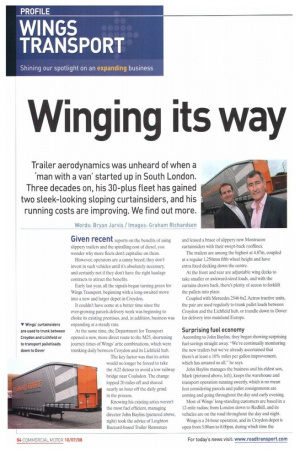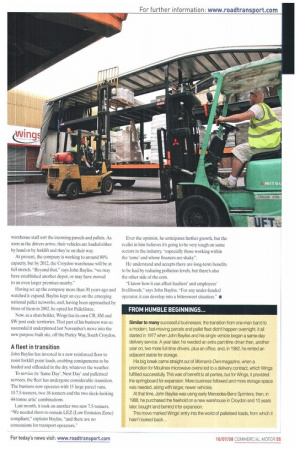Winging its way
Page 54

Page 55

If you've noticed an error in this article please click here to report it so we can fix it.
Trailer aerodynamics was unheard of when a man with a van' started up in South London. Three decades on, his 30-plus fleet has gained two sleek-looking sloping curtainsiders, and his running costs are improving. We find out more.
Words: Bryan Jarvis / images: Graham Richardson Given recent reports on the benefits of using slippery trailers and the spiralling cost of diesel, you wonder why more fleets don't capitalise on them.
However, operators are a canny breed; they don't invest in such vehicles until it's absolutely necessary, and certainly not if they don't have the right haulage contracts to attract the benefits.
Early last year, all the signals began turning green for Wings Transport, beginning with a long-awaited move into a new and larger depot in Croydon.
It couldn't have come at a better time since the ever-growing parcels delivery work was beginning to choke its existing premises, and, in addition, business was expanding at a steady rate.
At the same time, the Department for Transport opened a new, more direct route to the M25, shortening journey times of Wings' artic combinations, which were trunking daily between Croydon and its Lichfield hub.
The key factor was that its artics would no longer be forced to take the A22 detour to avoid a low railway bridge near Coulsdon. The change lopped 20 miles off and shaved nearly an hour off the daily grind in the process.
Knowing his existing artics weren't the most fuel efficient, managing director John Bayliss (pictured above, right) took the advice of Leighton Buzzard-based Trailer Resources and leased a brace of slippery new Montracon curtainsiders with their swept-back roc:dines.
The trailers are among the highest at 4.87m, coupled at a regular 1,250nun fifth wheel height and have extra fixed decking down the centre.
At the front and rear are adjustable wing decks to take smaller or awkward-sized loads, and with the curtains drawn back, there's plenty of access to forklift the pallets into place.
Coupled with Mercedes 2546 6x2 Actros tractive units, the pair are used regularly to trunk pallet loads between Croydon and the Lichfield hub, or trundle down to Dover for delivery into mainland Europe.
Surprising fuel economy
According to John Bayliss, they began showing surprising fuel savings straight away. "We're continually monitoring the new trailers but we've already ascertained that there's at least a 10% miles per gallon improvement, which has amazed us all," he says.
John Bayliss manages the business and his eldest son, Mark (pictured above, left), keeps the warehouse and transport operation running sweetly, which is no mean feat considering parcels and pallet consignments are coming and going throughout the day and early evening.
Most of Wings' long-standing customers are based in a 12-mile radius; from London down to Redhill. and its vehicles are on the road throughout the day and night.
Wings is a 24-hour operation, and its Croydon depot is open from 5.00am to 8.00pm, during which time the warehouse staff sort the incoming parcels and pallets. As soon as the drivers arrive, their vehicles are loaded either by hand or by forklift and they're on their way.
At present, the company is working to around 80% capacity, but by 2012, the Croydon warehouse will be at full stretch. "Beyond that," says John Bayliss, "we may have established another depot, or may have moved to an even larger premises nearby."
Having set up the company more than 30 years ago and watched it expand, Bayliss kept an eye on the emerging national pallet networks, and, having been approached by three of them in 2002, he opted for Palletforce.
Now, as a shareholder, Wings has its own CR, SM and SW post code territories. That part of his business was so successful it underpinned last November's move into the new purpose-built site, off the Purley Way, South Croydon.
A fleet in transition
John Bayliss has invested in a new reinforced floor to resist forklift point loads, enabling consignments to be loaded and offloaded in the dry, whatever the weather.
To service its 'Same Day', Next Day' and palletised services, the fleet has undergone considerable transition. The business now operates with 15 large parcel vans, 10 7.5-tonners, two 18-tonners and the two sleek-looking 44-tonne artic' combinations.
Last month, it took on another two new 7,5-tormers. "We needed them to remain LEZ (Low Emission Zone) compliant," explains Bayliss. "and there are no concessions for transport operators," Ever the optimist, he anticipates further growth, but the realist in him believes it's going to be very tough on some sectors in the industry, "especially those working within the 'zone' and whose finances are shaky".
He understand and accepts there are long-term benefits to be had by reducing pollution levels, but there's also the other side of the coin.
"I know how it can affect hauliers' and employees' livelihoods," says John Bayliss. "For any under-funded operator, it can develop into a bittersweet situation." •








































































































































































